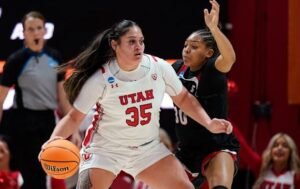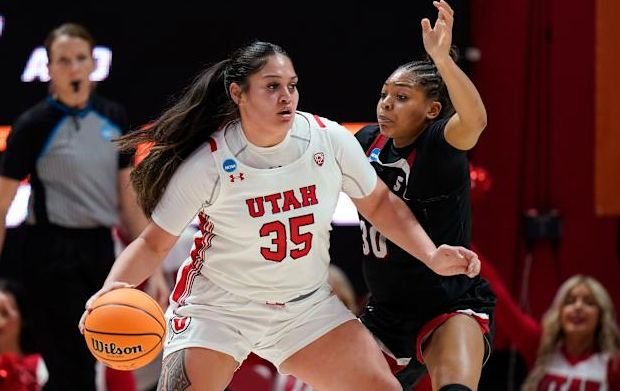How family has been the driving force of Alissa Pili’s evolution into a star

It’s easy for the Pili family to draw attention. Nine kids, plus two parents, often with aunts, uncles and cousins in tow. But when they settled into the stands of Mohegan Sun Arena in Uncasville, Connecticut, for the Hoophall Women’s Basketball Showcase, there was no fanfare. Their matching jerseys and T-shirts should have been a giveaway they were related to Utah senior Alissa Pili, but no one stopped to ask. Instead, all eyes were trained on the basketball royalty in the building: South Carolina and UConn.
That soon changed.
With 37 points against the Gamecocks, Pili announced herself to the arena, and the fans in attendance learned what her family, Utah and the Pac-12 have known for years: Alissa Pili is the real deal.
In three heavyweight matchups that included UCLA, Florida State, South Carolina, North Carolina and UConn, Pili was the best player in the building. And after her incredible performance, the Pili family’s exit was drastically different than its entrance.
“We couldn’t leave,” her dad, Billy Pili, said with a laugh. “We had so many people coming up to us, saying how good she was.”
They knew. And now so did everyone else.
“There are moments and opportunities that are different from everything else,” Alissa said. “That was one of them.”
There are no family photos hanging on the living room walls in the Pili home in Anchorage, Alaska. Instead, the room houses a basketball hoop. After too many pictures fell, and too many frames shattered, Billy realized the two things couldn’t co-exist. So he picked the hoop. It provides more memories, anyway.
Alissa and her siblings battle it out in one-on-one games, while the rest of the family sits on a couch that wraps around the living room, cheering and providing commentary. There are no out of bounds, no fouls and very few rules.
The hoop has been there for 15 years. The family moves furniture to allow for the makeshift “court.” Billy and his wife, Heather, have even had to patch holes in the living room walls in the aftermath of particularly competitive games. But the hoop is here to stay.
“We don’t have a big place. We have a tiny place,” Billy said with a laugh. “But we make it happen.”
Alissa, the second of nine siblings, started her life in Barrow (now known as Utqiagvik), Alaska, a town of 4,383 people. There wasn’t much to do, she says, other than go to school and go to the local gym, so that’s how she spent her days.
“Basketball is something that really brings our community together,” she said.
When Alissa was in elementary school, the family moved to Anchorage, Alaska’s biggest city. Her routine didn’t change. School, sports and family were still the fabric of her days.
Athletics for Alissa included much more than just basketball. Specialization is more and more common for athletes across the country, but not in Alaska, and not in the Pili family.
“My dad strongly believed that if you have a God-given talent, and skill, that you shouldn’t take it for granted,” Alissa said. “You should use it to the best of your ability and do everything you can to kind of utilize that.”
Alissa played, and excelled, in almost every sport.
Is there one she’s not good at?
“Honestly, no,” Alissa said with a laugh.
OK, so every sport.
As a kid, Alissa played football, she wrestled, played volleyball and did track. But she showed a particular affinity for basketball.
Alissa dominated high school players as a middle-schooler, and college coaches were taking notice. Basketball became her main sport, but never her only sport. And that’s part of the reason she’s excelled.
